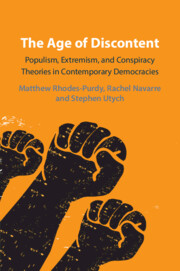Book contents
- The Age of Discontent
- The Age of Discontent
- Copyright page
- Dedication
- Contents
- Figures
- Tables
- Acknowledgements
- Abbreviations
- 1 Introduction
- 2 Left Behind vs. Backlash
- 3 Affective Political Economy
- 4 Affective Political Economy and Political Discontent
- 5 Frozen Parties, Failing Markets
- 6 Austerity, Regionalism, and Dueling Populisms in Spain
- 7 Corruption, Populism, and Contentious Politics in Brazil and Chile
- 8 The Dogs That Did Not Bark
- 9 Populism in Power
- 10 Conclusions
- References
- Index
7 - Corruption, Populism, and Contentious Politics in Brazil and Chile
Published online by Cambridge University Press: 02 March 2023
- The Age of Discontent
- The Age of Discontent
- Copyright page
- Dedication
- Contents
- Figures
- Tables
- Acknowledgements
- Abbreviations
- 1 Introduction
- 2 Left Behind vs. Backlash
- 3 Affective Political Economy
- 4 Affective Political Economy and Political Discontent
- 5 Frozen Parties, Failing Markets
- 6 Austerity, Regionalism, and Dueling Populisms in Spain
- 7 Corruption, Populism, and Contentious Politics in Brazil and Chile
- 8 The Dogs That Did Not Bark
- 9 Populism in Power
- 10 Conclusions
- References
- Index
Summary
Latin America differs from our other cases in crucial ways. It did not suffer as badly from the Great Recession as did many other regions, although it experienced its own crisis when the boom in commodity prices burst. And historically, cultural issues over race and ethnicity had not been as politicized as in Europe and North America. Nevertheless, we see a similar causal process in this region as in our other cases. As regional economies suffered, antagonism towards politics as usual increased. The nature of discontent, however, differed radically depending on the details of the dominant political order it opposed. In Brazil, discontent came to resemble Trumpism, with a focus on cultural issues that had been addressed by the formerly dominant Workers’ Party, while also addressing rampant corruption. In Chile, discontent centered on the elitism of Chile’s democracy, and the institutions that reinforced it, placed insurmountable barriers in the path of political outsiders and insurgent parties; as a result, discontent in Chile manifested as mass contention. This chapter uses analysis of existing datasets (including LAPOP and national election studies) to show how economic concerns, exacerbated by democratic deficits, drove discontent over cultural discontent, corruption, and elitism.
Keywords
- Type
- Chapter
- Information
- The Age of DiscontentPopulism, Extremism, and Conspiracy Theories in Contemporary Democracies, pp. 154 - 179Publisher: Cambridge University PressPrint publication year: 2023



